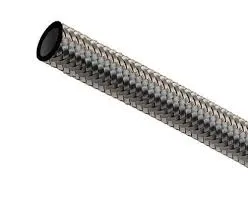Oct . 13, 2024 06:27 Back to list
Top High Durability Hydraulic Hoses for Superior Abrasion Resistance
Best Abrasion Resistant Hydraulic Hose Protecting Your Equipment
When it comes to hydraulic systems, the integrity of every component is crucial for optimal performance. Among these components, hydraulic hoses play a vital role in transferring fluid under high pressure. One of the most significant factors affecting the longevity and reliability of hydraulic hoses is their resistance to abrasion. In this article, we will explore the importance of abrasion-resistant hydraulic hoses, key features to look for, and some recommended options in the market.
Understanding Abrasion Resistance
Abrasion resistance refers to a material's ability to withstand wear and tear due to friction, impact, or contact with abrasive surfaces. In hydraulic applications, hoses often come into contact with rough surfaces, abrasive materials, and are subjected to high dynamic movements. As a result, they can quickly degrade, leading to leaks, bursts, or complete failures, which can be hazardous in industrial environments and costly for operations.
Importance of Choosing the Right Hose
Selecting the best abrasion-resistant hydraulic hose is vital for several reasons
1. Safety Hydraulic fluid leaks can be dangerous, potentially leading to accidents or equipment failure. An abrasion-resistant hose reduces these risks by maintaining its integrity longer.
2. Cost-Effectiveness While abrasion-resistant hoses may have a higher upfront cost, their durability leads to reduced maintenance and replacement expenses over time.
3. Operational Efficiency A reliable hydraulic hose ensures consistent fluid transfer, which is critical for the efficiency of hydraulic systems.
4. Extended Equipment Life Protecting hydraulic hoses against abrasion contributes to the overall lifespan of the hydraulic equipment, saving money and resources.
Key Features to Look for in Abrasion-Resistant Hoses
When searching for the best abrasion-resistant hydraulic hose, several features should be considered
1. Material Construction Hoses are usually made from rubber or thermoplastic materials. Look for hoses that incorporate advanced materials or have added coatings for increased abrasion resistance.
best abrasion resistant hydraulic hose

2. Inner Reinforcement Hoses reinforced with multiple layers of high-tensile strength fibers, such as polyester or steel wire, are more resistant to cuts and wear.
3. Outer Covering The outer layer should have a robust, anti-abrasive cover, which acts as a shield against external wear. Materials such as polyurethane or braided steel can significantly enhance resistance.
4. Temperature and Pressure Ratings Ensure that the hose can withstand the operational conditions of your hydraulic system, including maximum pressure and temperature ranges.
5. Flexibility and Bend Radius Abrasion-resistant hoses should still maintain flexibility for ease of installation and use in tight spaces. A minimal bend radius is crucial for avoiding kinks that can impede fluid flow.
Recommended Options
Several manufacturers are known for producing high-quality abrasion-resistant hydraulic hoses
1. Parker Hannifin Their range of hoses includes options specifically designed for high abrasion applications, featuring durable outer covers and excellent flexibility.
2. Eaton Known for their high-performance hydraulic solutions, Eaton offers hoses with enhanced abrasion resistance tailored for severe service environments.
3. Gates Gates hydraulic hoses combine durability with resistance to external wear and tear while providing excellent fluid conveyance capabilities.
4. Continental Their range includes hoses designed for both standard and specialized applications, featuring innovative materials for increased abrasion resistance.
Conclusion
Investing in the best abrasion-resistant hydraulic hose is essential for ensuring safety, efficiency, and cost-effectiveness in hydraulic applications. By understanding the key features and carefully selecting the right product, operators can protect their equipment and maximize performance. As technology continues to evolve, looking for advanced materials and designs will lead to even better solutions in the fight against hose abrasion. Ultimately, prioritizing the choice of hydraulic hoses will contribute significantly to the overall success of hydraulic operations.
-
Best Four Steel Wire Spiral Hose Hydraulic R12 – Durable High-Pressure Hose Manufacturer
NewsJul.08,2025
-
High-Quality 1/4 Hydraulic Hose – Soft, Flexible & Durable Rubber Hoses for Industrial Use
NewsJul.08,2025
-
1 1 2 Inch Hydraulic Flexible Hose - Durable, Reliable, High-Pressure Solutions
NewsJul.07,2025
-
High-Quality 1 2 Rubber Hose - Durable, Flexible Hydraulic Solutions
NewsJul.07,2025
-
Discover SAE Hydraulic Hose Types - High Quality & Durable Hoses from Leading Factory Supplier
NewsJul.06,2025
-
High Pressure Wire Hydraulic Rubber Hose Supplier Durable & Reliable 1SN Hose Solutions
NewsJul.06,2025
